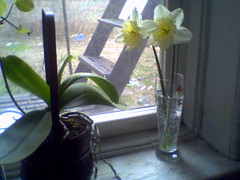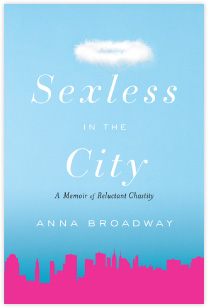Sea-legs, pt. 2
Basically, I’d wanted for most of my life to define my identity in terms of marriage and family. Once I faced the uncertain hope that was, it left me to find some other source of meaning. For which work and career seemed the obvious alternative … except that I’ve never been overly ambitious that way. I like the life of the mind, sure, but the things I like intellectually, I don’t have to do or get from a job, you know? And writing has always felt more organic, relational and creative. It’s not “work” in the same way.
The paying-dues blues
But I had to work. And since I had not an English or j-school degree, nor recent clips of my own, I despaired of ever finding work as a writer. Editor, yes; writer, no. And then there was that final disadvantage: since I went straight through to grad school, all of my age peers (in this oh-so-competitive city) had two more years of work experience. Though having an M.A. gave me some cachet, it was often confused with a theology degree — not something all that useful. I wasn’t quite an entry-level worker, but neither did I have the experience for the next level up. As much as the inefficiency and sheer boredom of my jobs was galling and humbling, there was no way around that year of two of being “underused” and paying my dues.
What I’ve learned from this and from watching my other friends is that, like it or not, most folks don’t jump into their dream job right away. All careers begin with a few years that test your character more than your skills or ability. If you’re of average or more intelligence, expect to feel frustration, but try to develop patience. You never know how these short-term “indignities” may bear fruit in the future. And if you’re a Christian, we know God puts a spiritual value on learning to persevere and rejoice in all things (which I don’t mean to say tritely or as if it’s easy; I know too well it’s not).
The funny thing about restlessness is, it’s partly a valid response to imperfect circumstances, partly an infirmity of the heart; the trick is knowing the difference. Much of my discontentment did abate once I started blogging and made peace with being a writer. Landing my current part-time job made much more sense of various jobs and interests I’d had, with seemingly little to connect them. There is a great peace that’s come from that, and I try to be always grateful.
Firmer footing
But not even these major blessings, as good as they are, have supplied that elusive sense of “purpose.” Then last fall, after launching into a “break-up” with my guy friend of highest esteem, I had an epiphany. The moments I’d felt my humanity most intensely were when I’d stopped to talk to homeless people (though some encounters moved me more than others), and when I’d been talking to folks about why the story of Jesus gives such hope to my life. When I thought about this, I realized these activities had in much common with Jesus’ work on earth, in which he later involved the disciples. Perhaps it was in seeking first God’s kingdom — the restoration of all the Bible says was lost with Adam’s fall — that I could find an ultimate purpose. Whether being single or having a family, writing a blog or a book or just random emails, all of my life no matter its course could be subsumed to that primary purpose.
That, at last, has finally given me peace and quenched a lot more of my restlessness. To the extent that I now live not for the approval of certain people or “success” in conventional terms — but for the pleasure of God alone — my sense of meaning and self-worth are based on fixed, unshakeable things. Even when I have a bad day and screw up, I can still take all of it to God, heap my pile of rubbish on the altar, and remember Isaiah said He deems even my best works to be no more than filthy rags. Sure, knowing God’s love isn’t based on what I’ve done means I have no “leverage” for demanding what I want, but it also means my standing with Him is based on something as sure as gravity, the sufficiency of what the Bible says was Jesus’ work on the cross.
If that’s not true, I am, as Paul told the Corinthians, “to be pitied more than all men.” But if it is true, then I have a purpose and calling and meaning in life that can survive losses, uncertainties and travails like none I know. I’m staking my life on that. Sure, Jesus only mentioned food and clothing as the things we should not seek first, but which God knows we need and will provide as we need, but I’m starting to think love and marriage are the same. If we who have surrendered to God through Jesus seek first His kingdom and His righteousness, He will provide things like spouses and children as He sees fit. Besides, who knows what depends on the children we’ll bear and the lives they’ll have? If so much is at stake in our dates and commitments, surely God can be trusted to do as He has appointed, and surely we are most ill-fit to try and run that part of our lives.





